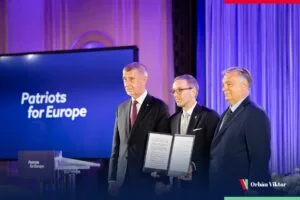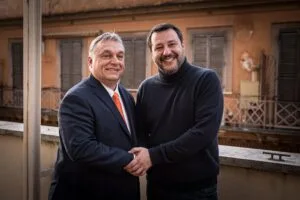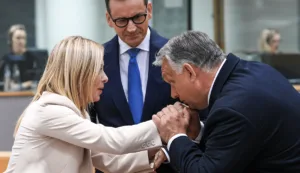Brussels – The complex domino pieces of the European far right may start falling into place, just days before the July 4 deadline to form the groups in the EU Parliament. And unleashing the potential political earthquake is Hungary’s Prime Minister, Viktor Orbán, who, after the June 6-9 European elections, plotted behind the scenes to place himself at the head of a new formation in the European sovereignist chessboard and not queue up with existing groups. And so, the Hungarian Premier, together with the former Czech Prime Minister and leader of the populist liberal-conservative ANO 2011 party, Andrej Babiš, and the President of the Austrian Freedom Party (Fpö), Herbert Kickl, yesterday (June 30) gave rise to the Patriots for Europe, the new parliamentary force – for the time being only on paper.
The July 4 deadline is not peremptory. A parliamentary group can be established at any time in the legislature. However, to coordinate and organize the work for the first session of Parliament that will begin on July 15, it is the date set to have time to do everything as best as possible.

Advertising the new division of the European right in Brussels was the Hungarian leader, who, at a press conference in Vienna yesterday, clearly said that “our goal is to become the strongest right-wing group in European politics” and claimed–for the umpteenth time since the elections in early June–that he wanted to “enforce the will of the voters,” who would like three things: “Peace, order, and development, while all they get from the current Brussels elite is war, migrants, and stagnation.” The Czech populist former Premier Babiš listed the “three main priorities” of Patriots for Europe: “The defense of national sovereignty, combating illegal immigration, and changes to the Green Deal.” For his part, Austrian nationalist right-wing leader Kickl proposed sweeping reforms of the EU institutions: “We want the European Parliament to be significantly smaller, about the same size as the U.S. House of Representatives,” i.e., to go from 720 members to 435.
In addition to revising the Treaties (in a more restrictive sense on the powers of the Union), canceling the Green Deal, and opposing EU policies on migration and asylum, the lowest common denominator of the three founders of the new European formation is the pro-Russian tendency of their respective parties and opposition to financial and military support for Ukraine. Soon, they should announce the political manifesto of Patriots for Europe. First, however, it must seek adherents to meet the minimum conditions to form parliamentary groups in the 10th term of the EU Parliament. No fewer than 23 MEPs from at least one-quarter of the member states (7) are needed to form a new parliamentary group. At the moment, only the second condition is missing: with the 10 Hungarians of Fidesz, the 7 Czechs of ANO 2011 (who recently left Renew Europe), and the 6 Austrians of Fpö, they already reached the minimum threshold of 23 MEPs, but there are still four national representations missing to be able to notify (by July 15) the European Parliament Presidency of the new group.

One has to look across the entire chessboard of the nationalist, populist, conservative, and extreme right to find national parties that could join the Patriots for Europe project. First and foremost, in the Identity and Democracy (ID) group, which risks falling apart after the announcement by the leader of Austria’s Fpö and the first signs of openness given by some of its members. “We are evaluating all the documents. However, I think it may be the right way to make a large group that aspires to be the third in the European Parliament,” the League Secretary, Matteo Salvini, said this morning (July 1) after calling the emergence of a new “strong, patriotic, cohesive, and against ploys” group “positive” particularly on its support for Ursula von der Leyen for the confirmation to European Commission. The Portuguese sovereignist right-wing Chega has declared that it will join the new project in Brussels.
Without Fpö (6), League (8), and Chega (2), the ID group would no longer have the numbers to exist and would have to go in search of new members. The 42 remaining (from the current 58) would be from only six parties: the French of National Rally (30), the Belgians of Vlaams Belang (3), the Dutch of Party for Freedom (6), the Danes of Danish People’s Party (1), the Czechs of Freedom and Direct Democracy and Trikolora (1), and the Estonians of the Estonian Conservative People’s Party (1). The focus will be on the moves of the National Rally, which is unlikely to accept dropping to second-to-last place among the groups in the EU Parliament (ahead only of the Left with 39) but has not yet made known its intentions to end the Identity and Democracy experience to join another group, whether it be Patriots for Europe or even the single camp with the European Conservatives and Reformists (ECR) of the Italian Premier, Giorgia Meloni. Just as the moves of the 15 MEPs of the radical right-wing German Alternative für Deutschland (AfD), expelled from the ID group in May and since yesterday also officially withdrawn from the European party, will have to be evaluated. A host of small and micro-extremist parties could join the project of the new group “The Sovereignists” led by AfD that has stalled (but is not dead).

To come close and achieve the goal of becoming the third force in the EU Parliament – currently in the hands of the conservative right-wing group with 83 MEPs – would require a sovereignist ‘big pile-up’ (highly unlikely), with a group composed of Fidesz, National Rally, AfD, League, Chega, Fpö, ANO 2011 that would count 78 members, plus other smaller parties ready to join. In an increasingly divided and quarrelsome European right-wing scenario, potential members of Patriots for Europe could also be taken away from Meloni’s group, Orbán’s closest ally at the table of EU leaders. Among them are the Spaniards of Vox (6), for example, although the big fish are the 20 Poles of Law and Justice (PiS) of former Premier Mateusz Morawiecki, who, however, are politically at odds with the Hungarians of Fidesz over the relationship with Putin’s Russia. After opening to the possibility of exiting the ECR, PiS said it was ready to resume dialogue with Fratelli d’Italia over the distribution of posts in the parliamentary group following the postponement of the constituent meeting initially scheduled for June 26.
English version by the Translation Service of Withub










